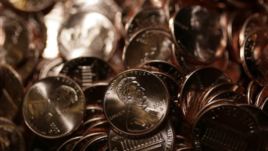當(dāng)前位置: Language Tips> VOA聽力> Special Speed News VOA慢速
分享到
This is the VOA Special English Economics Report.
Are you a saver or a spender?
"A penny saved is a penny earned." This old saying calls attention to the wisdom of saving money. "Putting money away for a rainy day" is another way to talk about saving for the future.
People who hate to spend money are known as "tightwads," while those who like to get the most value for their money are called "thrifty." A thrifty person is different from a "spendthrift." A spendthrift is someone who spends wastefully. People like that are often said to spend money "like a drunken sailor" or "like there's no tomorrow."
In the United States, people who want to start a savings account have different choices of where to put their money. These include banks and credit unions. Credit unions are cooperatives for people who have some kind of connection. For example, the members might work for a university or a government agency. Most credit unions are nonprofit organizations.

Credit unions, banks and other financial institutions pay interest on savings accounts. But the interest rates are low. Certificates of deposit pay higher returns. With a certificate of deposit, or CD, a person agrees not to withdraw the money for a certain period of time. This term could be anywhere from a few months to several years. Longer terms, and larger amounts, pay higher interest. People can withdraw their money early but they have to pay a penalty.
Another way to save is through a money market fund. This is a kind of mutual fund. Mutual funds invest money from many people. The money is sometimes placed in short-term government securities. Money market funds, however, may not be federally guaranteed like other kinds of savings. The Federal Deposit Insurance Corporation guarantees savings up to 250,000 dollars.
In a number of countries, people have been saving less over the years. The Organization for Economic Cooperation and Development is a group of 34 countries. The OECD says in 1990, Americans had a household savings rate of seven percent. This year, that rate is expected to be a little more than four percent. Many European countries have higher rates, but Americans save more than families in countries like Japan and South Korea.
And that's the VOA Special English Economics Report. To read, listen and learn English, go to voaspecialenglish.com. You can also find our captioned videos at the VOA Learning English channel on YouTube. I'm Shirley Griffith.
英國(guó)“超級(jí)守財(cái)奴”留25萬英鎊遺產(chǎn)
Microsavings could mean big gains for the world's poor
Retirement savings rule 2: plan for your future goals and needs
(來源:VOA 編輯:旭燕)
分享到
關(guān)注和訂閱


關(guān)于我們 | 聯(lián)系方式 | 招聘信息
電話:8610-84883645
傳真:8610-84883500
Email: languagetips@chinadaily.com.cn